
ApeRAG
ApeRAG: Production-ready GraphRAG with multi-modal indexing, AI agents, MCP support, and scalable K8s deployment
Stars: 780
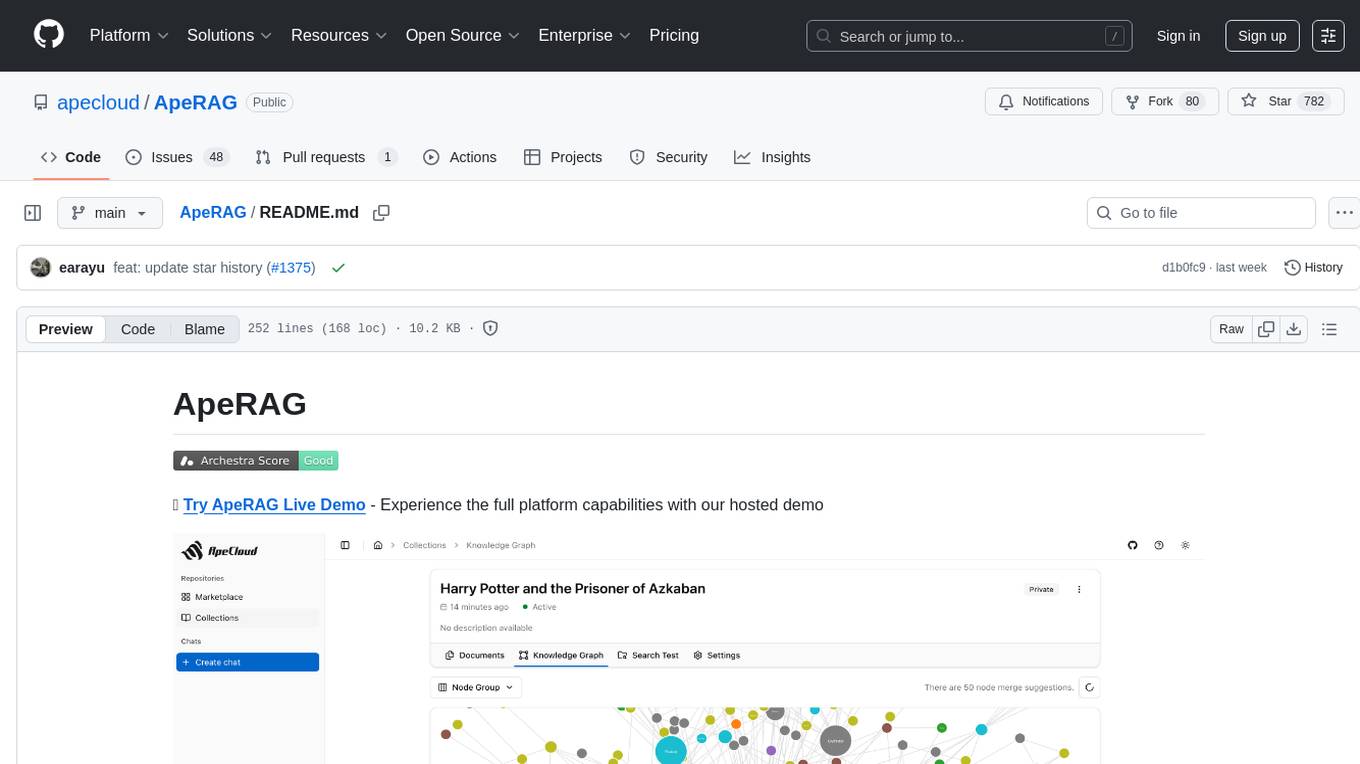
ApeRAG is a production-ready platform for Retrieval-Augmented Generation (RAG) that combines Graph RAG, vector search, and full-text search with advanced AI agents. It is ideal for building Knowledge Graphs, Context Engineering, and deploying intelligent AI agents for autonomous search and reasoning across knowledge bases. The platform offers features like advanced index types, intelligent AI agents with MCP support, enhanced Graph RAG with entity normalization, multimodal processing, hybrid retrieval engine, MinerU integration for document parsing, production-grade deployment with Kubernetes, enterprise management features, MCP integration, and developer-friendly tools for customization and contribution.
README:
🚀 Try ApeRAG Live Demo - Experience the full platform capabilities with our hosted demo
ApeRAG is a production-ready RAG (Retrieval-Augmented Generation) platform that combines Graph RAG, vector search, and full-text search with advanced AI agents. Build sophisticated AI applications with hybrid retrieval, multimodal document processing, intelligent agents, and enterprise-grade management features.
ApeRAG is the best choice for building your own Knowledge Graph, Context Engineering, and deploying intelligent AI agents that can autonomously search and reason across your knowledge base.
- Quick Start
- Key Features
- Kubernetes Deployment (Recommended for Production)
- Development
- Build Docker Image
- Acknowledgments
- License
Before installing ApeRAG, make sure your machine meets the following minimum system requirements:
- CPU >= 2 Core
- RAM >= 4 GiB
- Docker & Docker Compose
The easiest way to start ApeRAG is through Docker Compose. Before running the following commands, make sure that Docker and Docker Compose are installed on your machine:
git clone https://github.com/apecloud/ApeRAG.git
cd ApeRAG
cp envs/env.template .env
docker-compose up -d --pull alwaysAfter running, you can access ApeRAG in your browser at:
- Web Interface: http://localhost:3000/web/
- API Documentation: http://localhost:8000/docs
ApeRAG supports MCP (Model Context Protocol) integration, allowing AI assistants to interact with your knowledge base directly. After starting the services, configure your MCP client with:
{
"mcpServers": {
"aperag-mcp": {
"url": "https://rag.apecloud.com/mcp",
"headers": {
"Authorization": "Bearer your-api-key-here"
}
}
}
}Important: Replace http://localhost:8000 with your actual ApeRAG API URL and your-api-key-here with a valid API key from your ApeRAG settings.
The MCP server provides:
- Collection browsing: List and explore your knowledge collections
- Hybrid search: Search using vector, full-text, and graph methods
- Intelligent querying: Ask natural language questions about your documents
For enhanced document parsing capabilities, ApeRAG supports an advanced document parsing service powered by MinerU, which provides superior parsing for complex documents, tables, and formulas.
Enhanced Document Parsing Commands
# Enable advanced document parsing service
DOCRAY_HOST=http://aperag-docray:8639 docker compose --profile docray up -d
# Enable advanced parsing with GPU acceleration
DOCRAY_HOST=http://aperag-docray-gpu:8639 docker compose --profile docray-gpu up -dOr use the Makefile shortcuts (requires GNU Make):
# Enable advanced document parsing service
make compose-up WITH_DOCRAY=1
# Enable advanced parsing with GPU acceleration (recommended)
make compose-up WITH_DOCRAY=1 WITH_GPU=1For developers interested in source code development, advanced configurations, or contributing to ApeRAG, please refer to our Development Guide for detailed setup instructions.
1. Advanced Index Types: Five comprehensive index types for optimal retrieval: Vector, Full-text, Graph, Summary, and Vision - providing multi-dimensional document understanding and search capabilities.
2. Intelligent AI Agents: Built-in AI agents with MCP (Model Context Protocol) tool support that can automatically identify relevant collections, search content intelligently, and provide web search capabilities for comprehensive question answering.
3. Enhanced Graph RAG with Entity Normalization: Deeply modified LightRAG implementation with advanced entity normalization (entity merging) for cleaner knowledge graphs and improved relational understanding.
4. Multimodal Processing & Vision Support: Complete multimodal document processing including vision capabilities for images, charts, and visual content analysis alongside traditional text processing.
5. Hybrid Retrieval Engine: Sophisticated retrieval system combining Graph RAG, vector search, full-text search, summary-based retrieval, and vision-based search for comprehensive document understanding.
6. MinerU Integration: Advanced document parsing service powered by MinerU technology, providing superior parsing for complex documents, tables, formulas, and scientific content with optional GPU acceleration.
7. Production-Grade Deployment: Full Kubernetes support with Helm charts and KubeBlocks integration for simplified deployment of production-grade databases (PostgreSQL, Redis, Qdrant, Elasticsearch, Neo4j).
8. Enterprise Management: Built-in audit logging, LLM model management, graph visualization, comprehensive document management interface, and agent workflow management.
9. MCP Integration: Full support for Model Context Protocol (MCP), enabling seamless integration with AI assistants and tools for direct knowledge base access and intelligent querying.
10. Developer Friendly: FastAPI backend, React frontend, async task processing with Celery, extensive testing, comprehensive development guides, and agent development framework for easy contribution and customization.
Enterprise-grade deployment with high availability and scalability
Deploy ApeRAG to Kubernetes using our provided Helm chart. This approach offers high availability, scalability, and production-grade management capabilities.
- Kubernetes cluster (v1.20+)
-
kubectlconfigured and connected to your cluster - Helm v3+ installed
First, clone the ApeRAG repository to get the deployment files:
git clone https://github.com/apecloud/ApeRAG.git
cd ApeRAGApeRAG requires PostgreSQL, Redis, Qdrant, and Elasticsearch. You have two options:
Option A: Use existing databases - If you already have these databases running in your cluster, edit deploy/aperag/values.yaml to configure your database connection details, then skip to Step 2.
Option B: Deploy databases with KubeBlocks - Use our automated database deployment (database connections are pre-configured):
# Navigate to database deployment scripts
cd deploy/databases/
# (Optional) Review configuration - defaults work for most cases
# edit 00-config.sh
# Install KubeBlocks and deploy databases
bash ./01-prepare.sh # Installs KubeBlocks
bash ./02-install-database.sh # Deploys PostgreSQL, Redis, Qdrant, Elasticsearch
# Monitor database deployment
kubectl get pods -n default
# Return to project root for Step 2
cd ../../Wait for all database pods to be in Running status before proceeding.
# If you deployed databases with KubeBlocks in Step 1, database connections are pre-configured
# If you're using existing databases, edit deploy/aperag/values.yaml with your connection details
# Deploy ApeRAG
helm install aperag ./deploy/aperag --namespace default --create-namespace
# Monitor ApeRAG deployment
kubectl get pods -n default -l app.kubernetes.io/instance=aperagResource Requirements: By default, includes doc-ray service (requires 4+ CPU cores, 8GB+ RAM). To disable: set docray.enabled: false in values.yaml.
Advanced Settings: Review values.yaml for additional configuration options including images, resources, and Ingress settings.
Once deployed, access ApeRAG using port forwarding:
# Forward ports for quick access
kubectl port-forward svc/aperag-frontend 3000:3000 -n default
kubectl port-forward svc/aperag-api 8000:8000 -n default
# Access in browser
# Web Interface: http://localhost:3000
# API Documentation: http://localhost:8000/docsFor production environments, configure Ingress in values.yaml for external access.
Database Issues: See deploy/databases/README.md for KubeBlocks management, credentials, and uninstall procedures.
Pod Status: Check pod logs for any deployment issues:
kubectl logs -f deployment/aperag-api -n default
kubectl logs -f deployment/aperag-frontend -n defaultApeRAG integrates and builds upon several excellent open-source projects:
The graph-based knowledge retrieval capabilities in ApeRAG are powered by a deeply modified version of LightRAG:
- Paper: "LightRAG: Simple and Fast Retrieval-Augmented Generation" (arXiv:2410.05779)
- Authors: Zirui Guo, Lianghao Xia, Yanhua Yu, Tu Ao, Chao Huang
- License: MIT License
We have extensively modified LightRAG to support production-grade concurrent processing, distributed task queues (Celery/Prefect), and stateless operations. See our LightRAG modifications changelog for details.
ApeRAG is licensed under the Apache License 2.0. See the LICENSE file for details.
For Tasks:
Click tags to check more tools for each tasksFor Jobs:
Alternative AI tools for ApeRAG
Similar Open Source Tools

ApeRAG
ApeRAG is a production-ready platform for Retrieval-Augmented Generation (RAG) that combines Graph RAG, vector search, and full-text search with advanced AI agents. It is ideal for building Knowledge Graphs, Context Engineering, and deploying intelligent AI agents for autonomous search and reasoning across knowledge bases. The platform offers features like advanced index types, intelligent AI agents with MCP support, enhanced Graph RAG with entity normalization, multimodal processing, hybrid retrieval engine, MinerU integration for document parsing, production-grade deployment with Kubernetes, enterprise management features, MCP integration, and developer-friendly tools for customization and contribution.

WeKnora
WeKnora is a document understanding and semantic retrieval framework based on large language models (LLM), designed specifically for scenarios with complex structures and heterogeneous content. The framework adopts a modular architecture, integrating multimodal preprocessing, semantic vector indexing, intelligent recall, and large model generation reasoning to build an efficient and controllable document question-answering process. The core retrieval process is based on the RAG (Retrieval-Augmented Generation) mechanism, combining context-relevant segments with language models to achieve higher-quality semantic answers. It supports various document formats, intelligent inference, flexible extension, efficient retrieval, ease of use, and security and control. Suitable for enterprise knowledge management, scientific literature analysis, product technical support, legal compliance review, and medical knowledge assistance.
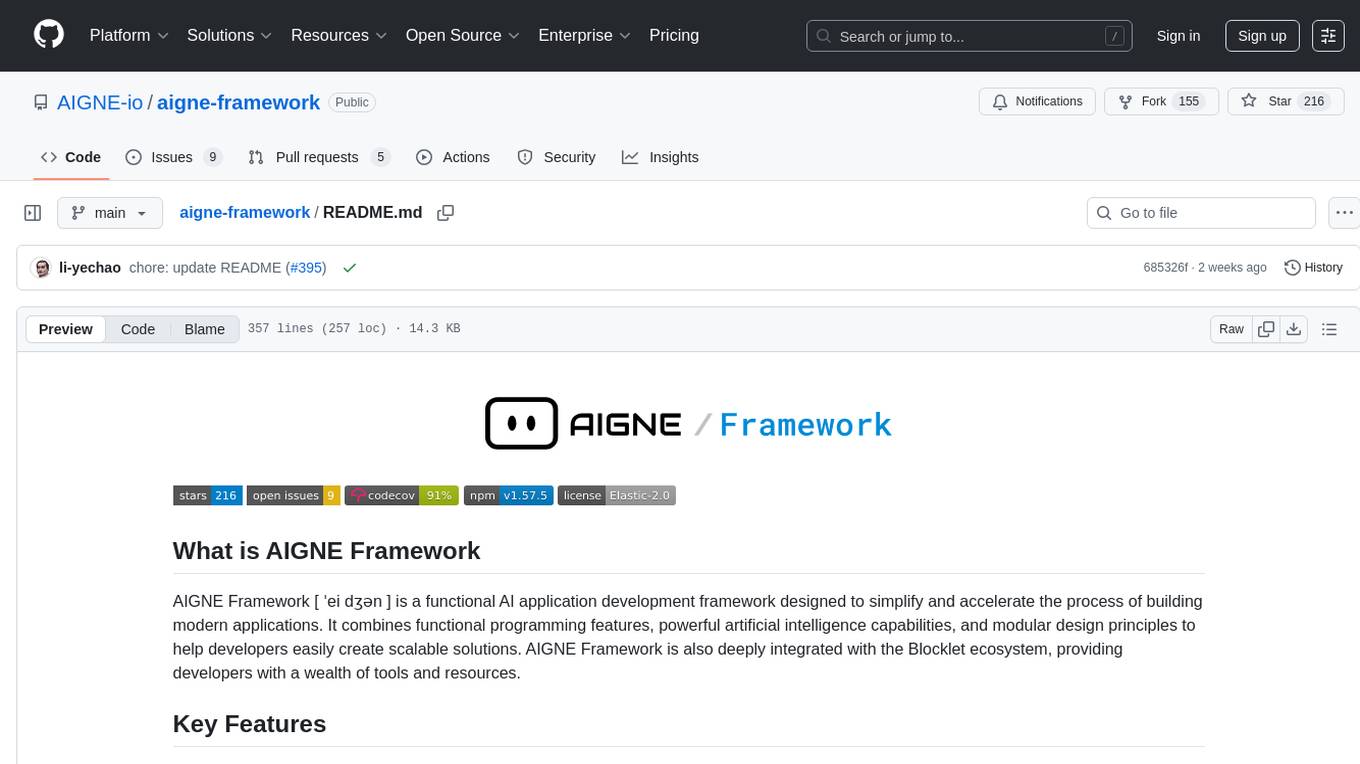
aigne-framework
AIGNE Framework is a functional AI application development framework designed to simplify and accelerate the process of building modern applications. It combines functional programming features, powerful artificial intelligence capabilities, and modular design principles to help developers easily create scalable solutions. With key features like modular design, TypeScript support, multiple AI model support, flexible workflow patterns, MCP protocol integration, code execution capabilities, and Blocklet ecosystem integration, AIGNE Framework offers a comprehensive solution for developers. The framework provides various workflow patterns such as Workflow Router, Workflow Sequential, Workflow Concurrency, Workflow Handoff, Workflow Reflection, Workflow Orchestration, Workflow Code Execution, and Workflow Group Chat to address different application scenarios efficiently. It also includes built-in MCP support for running MCP servers and integrating with external MCP servers, along with packages for core functionality, agent library, CLI, and various models like OpenAI, Gemini, Claude, and Nova.
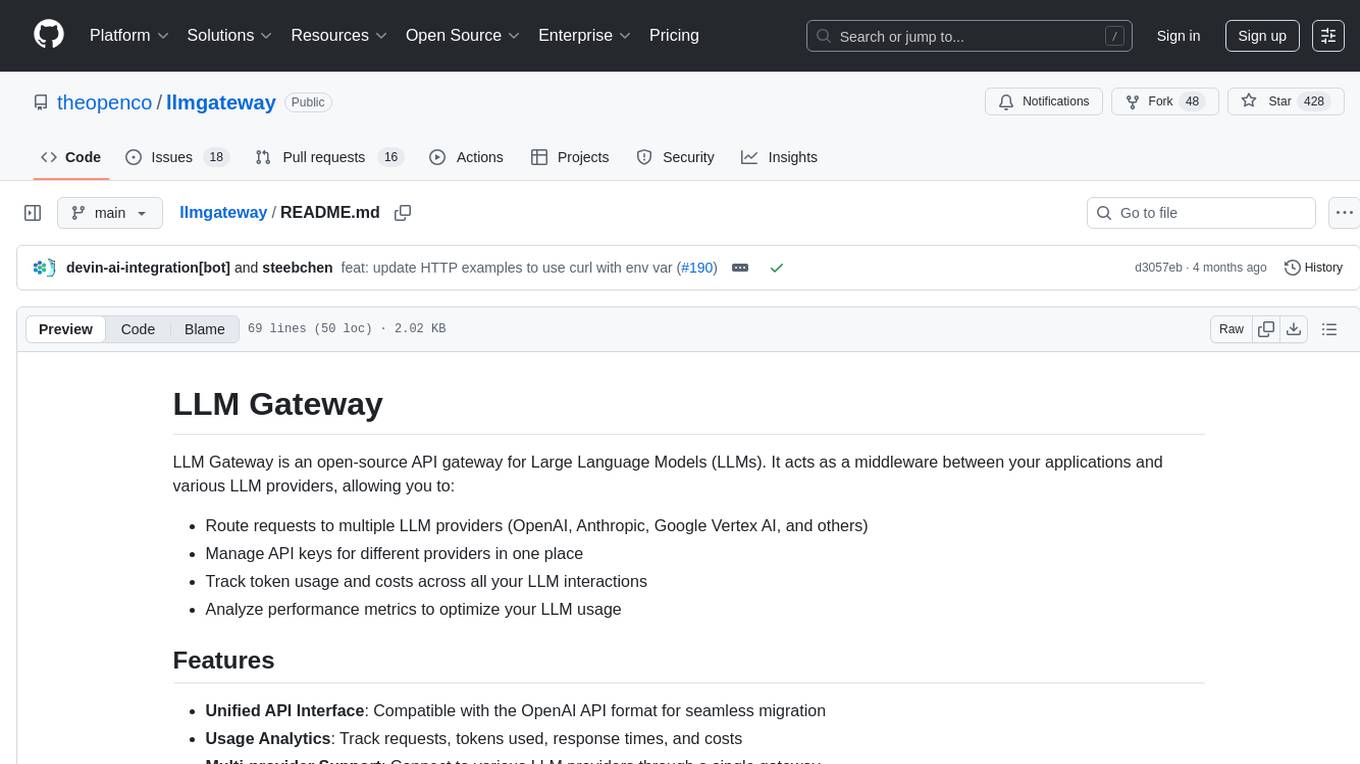
llmgateway
The llmgateway repository is a tool that provides a gateway for interacting with various LLM (Large Language Model) models. It allows users to easily access and utilize pre-trained language models for tasks such as text generation, sentiment analysis, and language translation. The tool simplifies the process of integrating LLMs into applications and workflows, enabling developers to leverage the power of state-of-the-art language models for various natural language processing tasks.
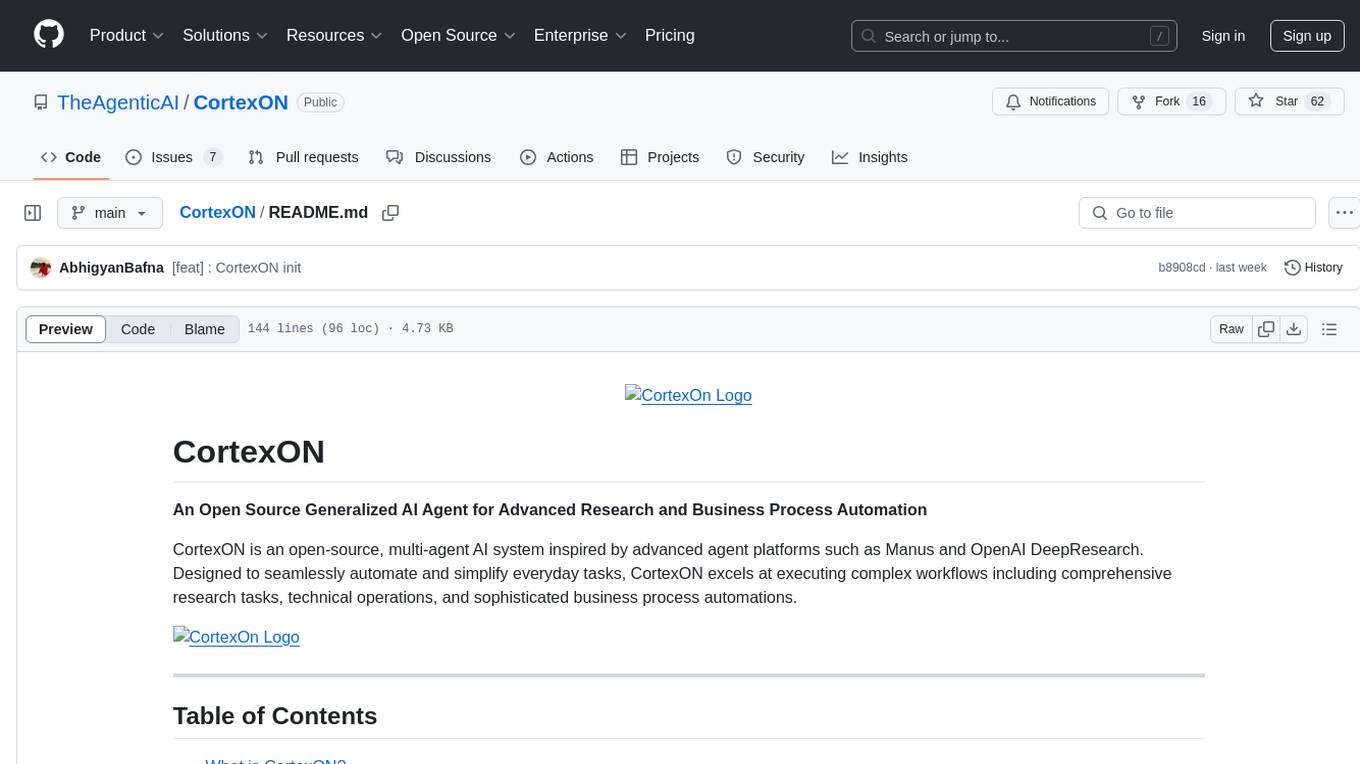
CortexON
CortexON is an open-source, multi-agent AI system designed to automate and simplify everyday tasks. It integrates specialized agents like Web Agent, File Agent, Coder Agent, Executor Agent, and API Agent to accomplish user-defined objectives. CortexON excels at executing complex workflows, research tasks, technical operations, and business process automations by dynamically coordinating the agents' unique capabilities. It offers advanced research automation, multi-agent orchestration, integration with third-party APIs, code generation and execution, efficient file and data management, and personalized task execution for travel planning, market analysis, educational content creation, and business intelligence.
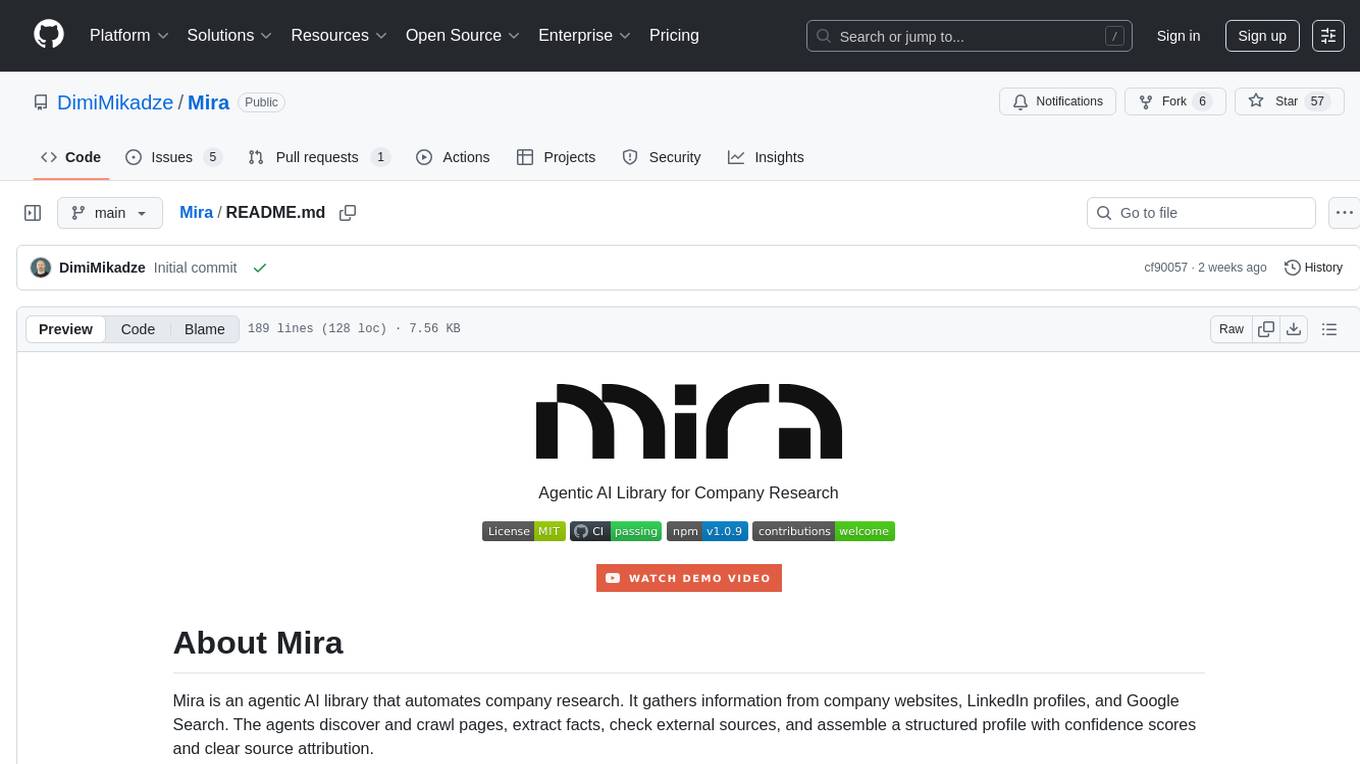
Mira
Mira is an agentic AI library designed for automating company research by gathering information from various sources like company websites, LinkedIn profiles, and Google Search. It utilizes a multi-agent architecture to collect and merge data points into a structured profile with confidence scores and clear source attribution. The core library is framework-agnostic and can be integrated into applications, pipelines, or custom workflows. Mira offers features such as real-time progress events, confidence scoring, company criteria matching, and built-in services for data gathering. The tool is suitable for users looking to streamline company research processes and enhance data collection efficiency.
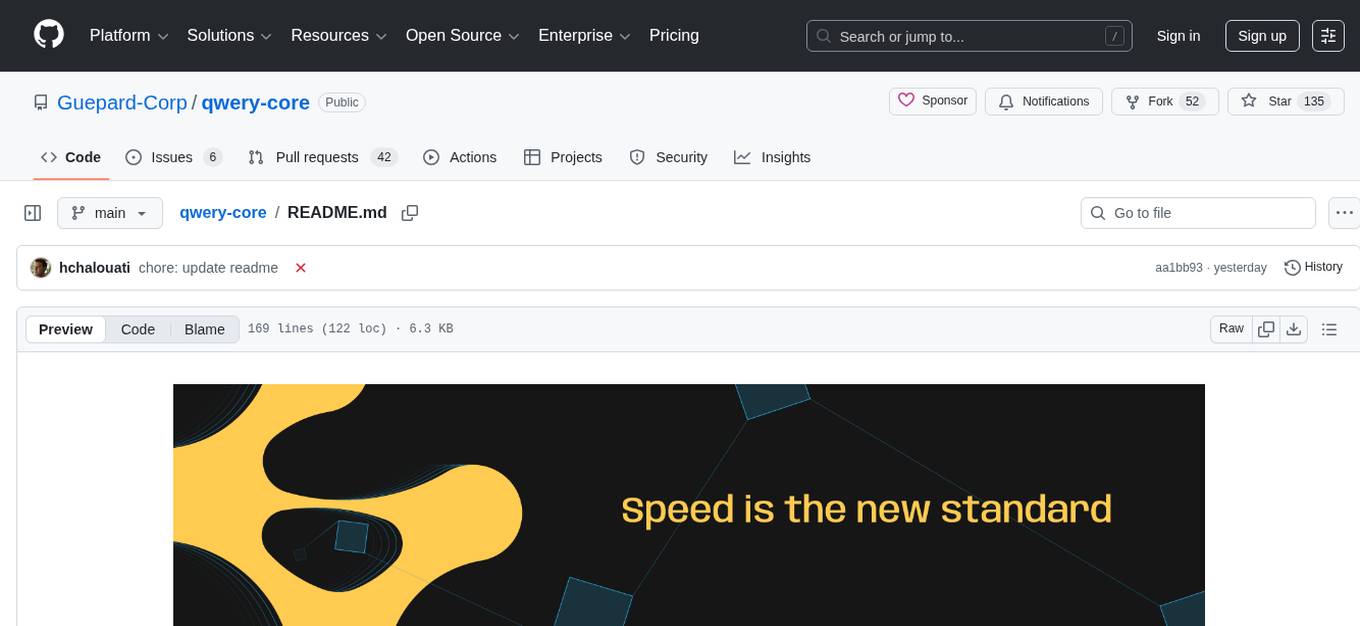
qwery-core
Qwery is a platform for querying and visualizing data using natural language without technical knowledge. It seamlessly integrates with various datasources, generates optimized queries, and delivers outcomes like result sets, dashboards, and APIs. Features include natural language querying, multi-database support, AI-powered agents, visual data apps, desktop & cloud options, template library, and extensibility through plugins. The project is under active development and not yet suitable for production use.
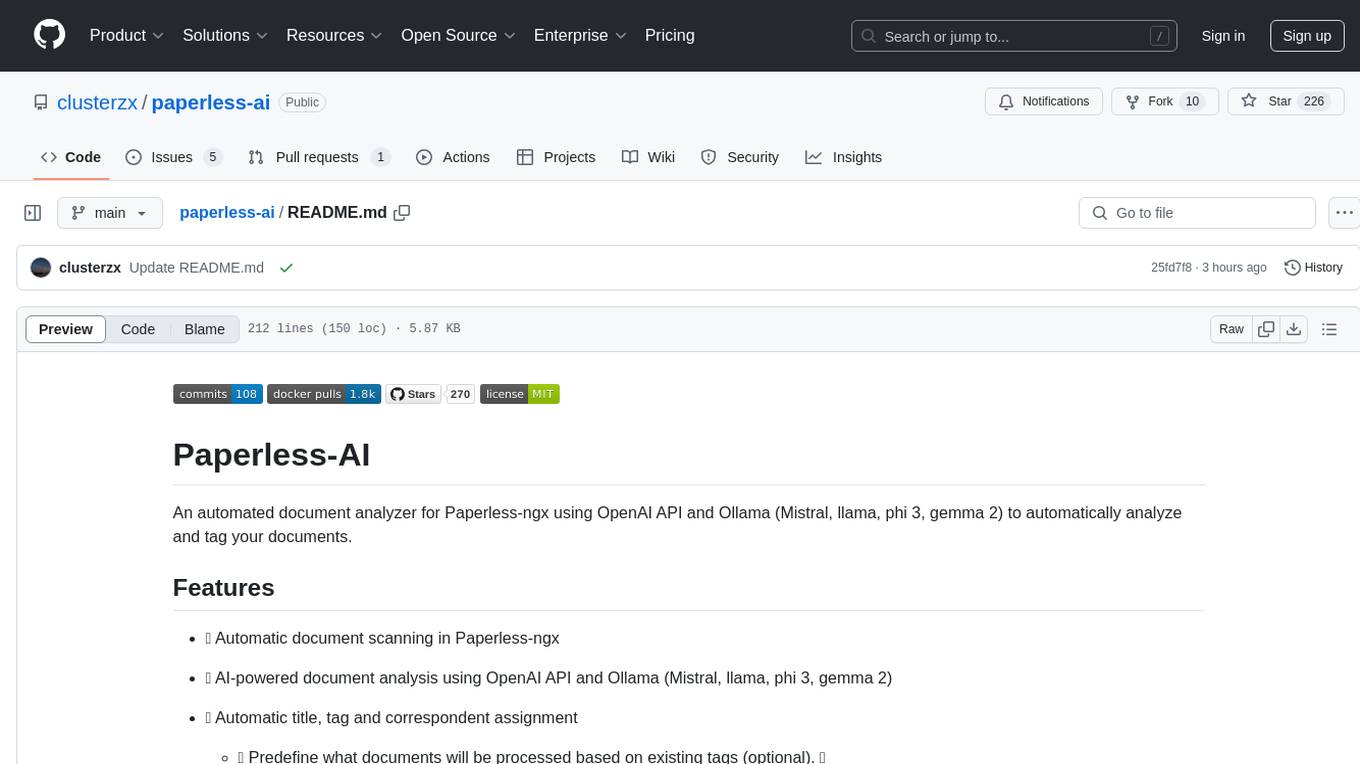
paperless-ai
Paperless-AI is an automated document analyzer tool designed for Paperless-ngx users. It utilizes the OpenAI API and Ollama (Mistral, llama, phi 3, gemma 2) to automatically scan, analyze, and tag documents. The tool offers features such as automatic document scanning, AI-powered document analysis, automatic title and tag assignment, manual mode for analyzing documents, easy setup through a web interface, document processing dashboard, error handling, and Docker support. Users can configure the tool through a web interface and access a debug interface for monitoring and troubleshooting. Paperless-AI aims to streamline document organization and analysis processes for users with access to Paperless-ngx and AI capabilities.
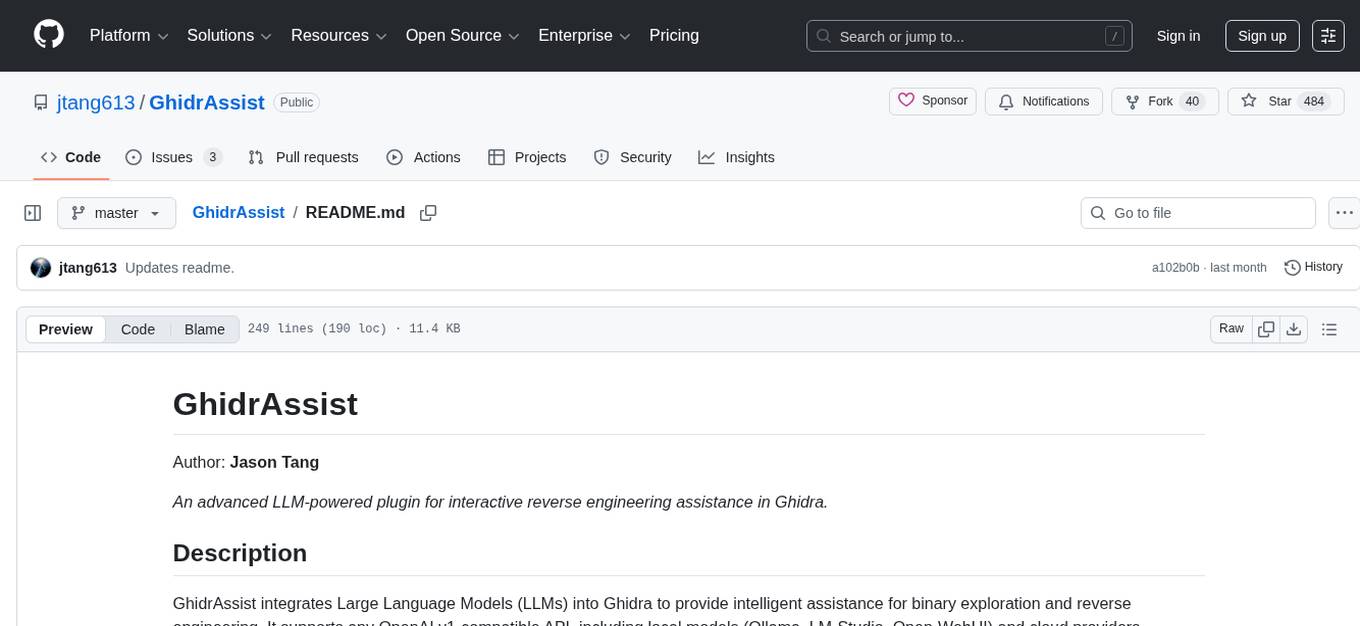
GhidrAssist
GhidrAssist is an advanced LLM-powered plugin for interactive reverse engineering assistance in Ghidra. It integrates Large Language Models (LLMs) to provide intelligent assistance for binary exploration and reverse engineering. The tool supports various OpenAI v1-compatible APIs, including local models and cloud providers. Key features include code explanation, interactive chat, custom queries, Graph-RAG knowledge system with semantic knowledge graph, community detection, security feature extraction, semantic graph tab, extended thinking/reasoning control, ReAct agentic mode, MCP integration, function calling, actions tab, RAG (Retrieval Augmented Generation), and RLHF dataset generation. The plugin uses a modular, service-oriented architecture with core services, Graph-RAG backend, data layer, and UI components.
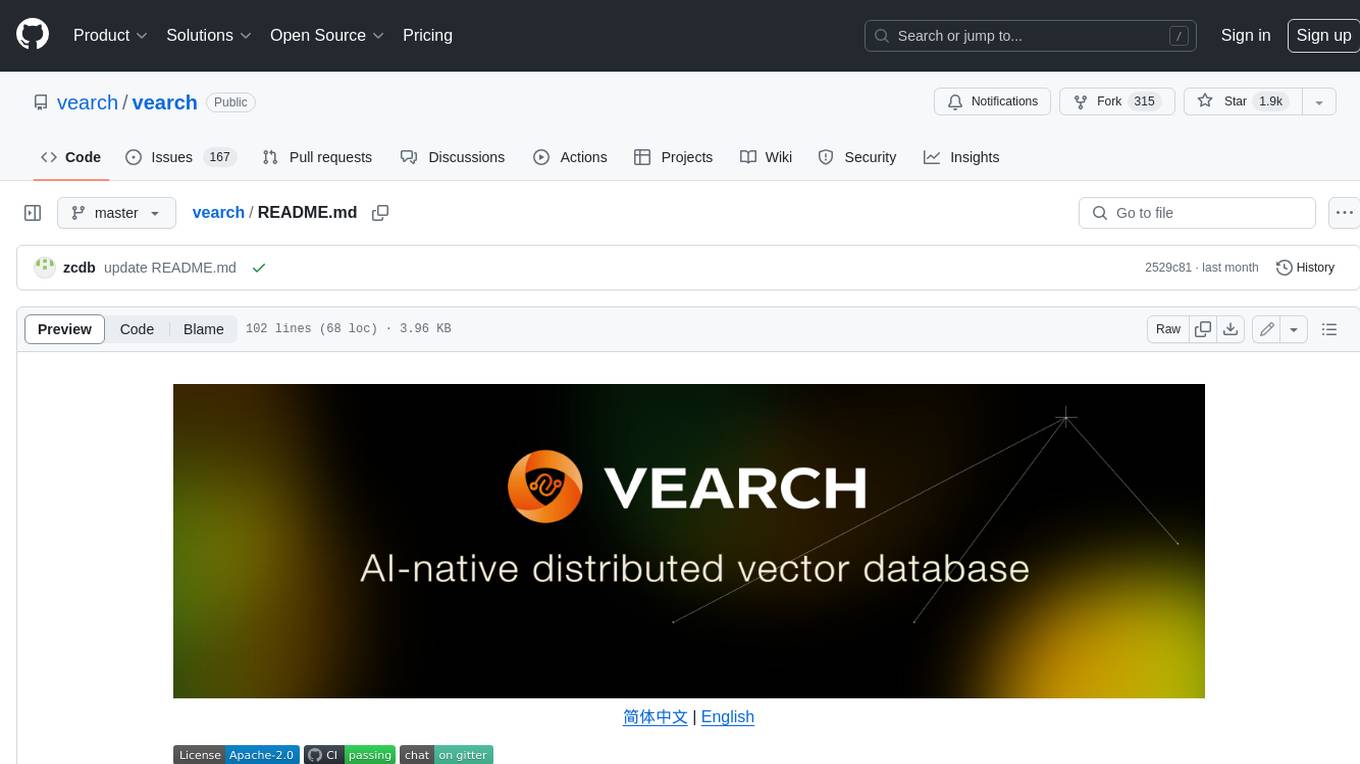
vearch
Vearch is a cloud-native distributed vector database designed for efficient similarity search of embedding vectors in AI applications. It supports hybrid search with vector search and scalar filtering, offers fast vector retrieval from millions of objects in milliseconds, and ensures scalability and reliability through replication and elastic scaling out. Users can deploy Vearch cluster on Kubernetes, add charts from the repository or locally, start with Docker-compose, or compile from source code. The tool includes components like Master for schema management, Router for RESTful API, and PartitionServer for hosting document partitions with raft-based replication. Vearch can be used for building visual search systems for indexing images and offers a Python SDK for easy installation and usage. The tool is suitable for AI developers and researchers looking for efficient vector search capabilities in their applications.
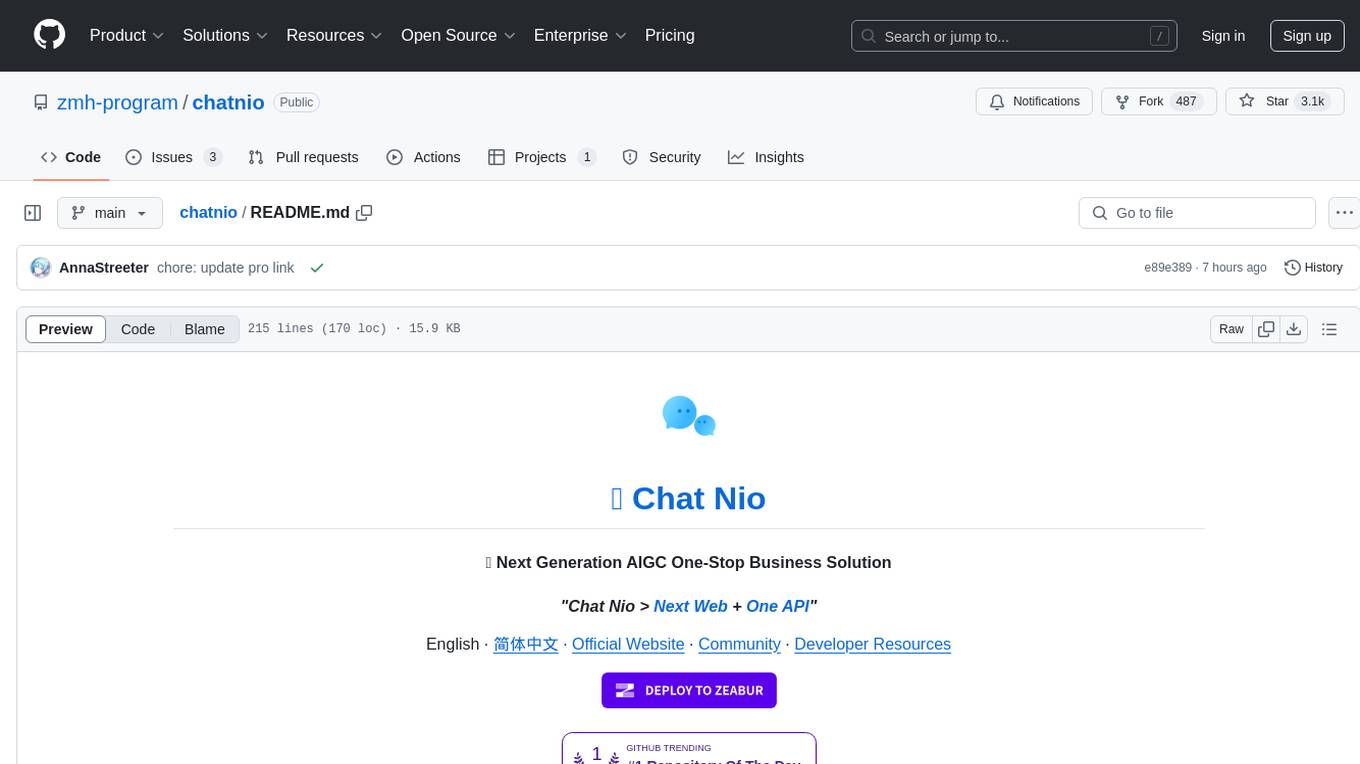
chatnio
Chat Nio is a next-generation AIGC one-stop business solution that combines the advantages of frontend-oriented lightweight deployment projects with powerful API distribution systems. It offers rich model support, beautiful UI design, complete Markdown support, multi-theme support, internationalization support, text-to-image support, powerful conversation sync, model market & preset system, rich file parsing, full model internet search, Progressive Web App (PWA) support, comprehensive backend management, multiple billing methods, innovative model caching, and additional features. The project aims to address limitations in conversation synchronization, billing, file parsing, conversation URL sharing, channel management, and API call support found in existing AIGC commercial sites, while also providing a user-friendly interface design and C-end features.

griptape
Griptape is a modular Python framework for building AI-powered applications that securely connect to your enterprise data and APIs. It offers developers the ability to maintain control and flexibility at every step. Griptape's core components include Structures (Agents, Pipelines, and Workflows), Tasks, Tools, Memory (Conversation Memory, Task Memory, and Meta Memory), Drivers (Prompt and Embedding Drivers, Vector Store Drivers, Image Generation Drivers, Image Query Drivers, SQL Drivers, Web Scraper Drivers, and Conversation Memory Drivers), Engines (Query Engines, Extraction Engines, Summary Engines, Image Generation Engines, and Image Query Engines), and additional components (Rulesets, Loaders, Artifacts, Chunkers, and Tokenizers). Griptape enables developers to create AI-powered applications with ease and efficiency.
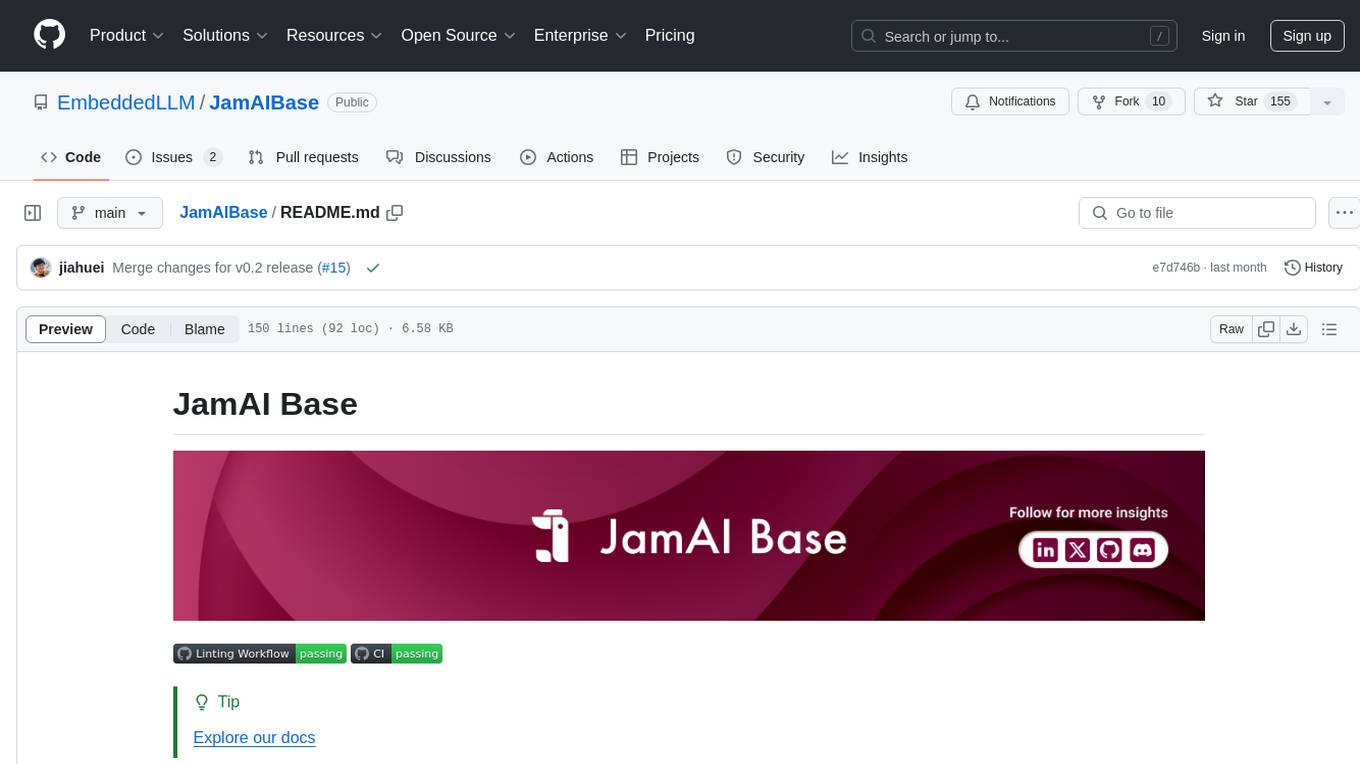
JamAIBase
JamAI Base is an open-source platform integrating SQLite and LanceDB databases with managed memory and RAG capabilities. It offers built-in LLM, vector embeddings, and reranker orchestration accessible through a spreadsheet-like UI and REST API. Users can transform static tables into dynamic entities, facilitate real-time interactions, manage structured data, and simplify chatbot development. The tool focuses on ease of use, scalability, flexibility, declarative paradigm, and innovative RAG techniques, making complex data operations accessible to users with varying technical expertise.
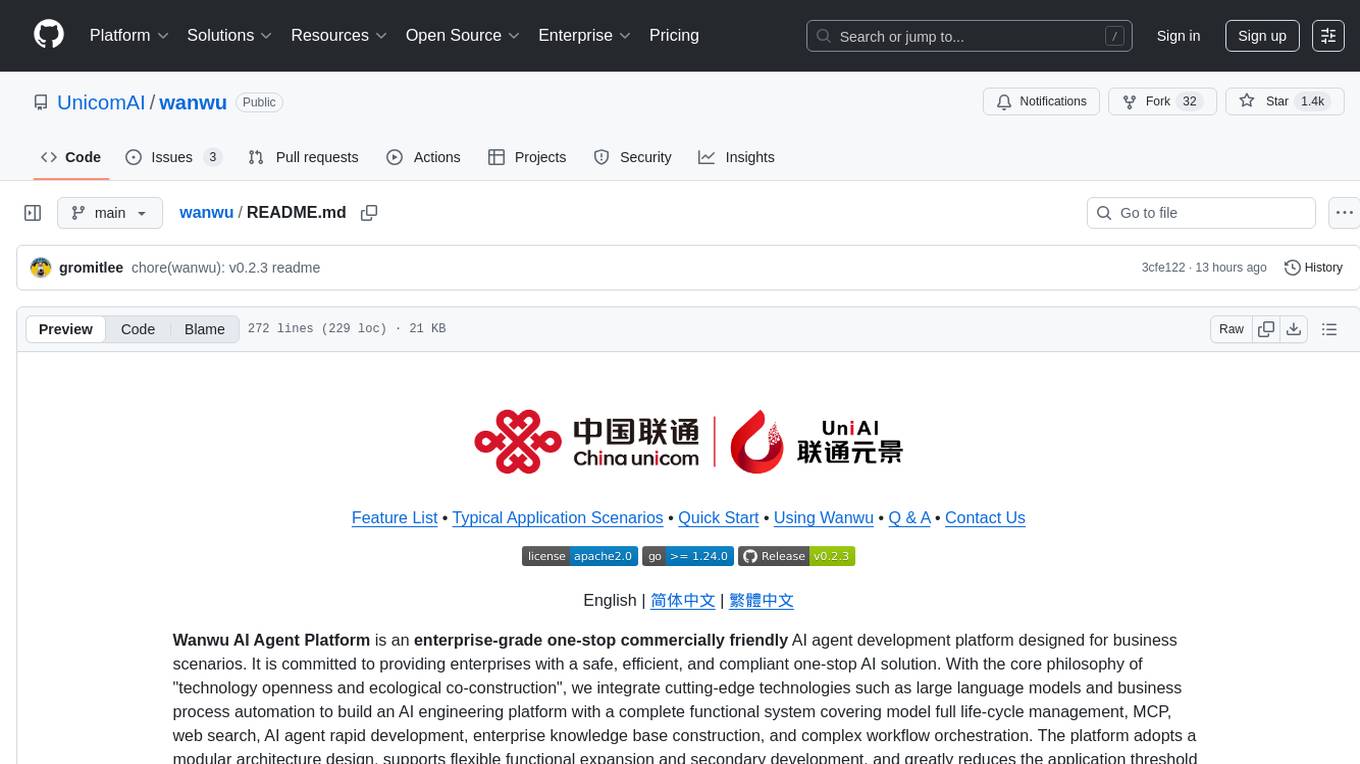
wanwu
Wanwu AI Agent Platform is an enterprise-grade one-stop commercially friendly AI agent development platform designed for business scenarios. It provides enterprises with a safe, efficient, and compliant one-stop AI solution. The platform integrates cutting-edge technologies such as large language models and business process automation to build an AI engineering platform covering model full life-cycle management, MCP, web search, AI agent rapid development, enterprise knowledge base construction, and complex workflow orchestration. It supports modular architecture design, flexible functional expansion, and secondary development, reducing the application threshold of AI technology while ensuring security and privacy protection of enterprise data. It accelerates digital transformation, cost reduction, efficiency improvement, and business innovation for enterprises of all sizes.
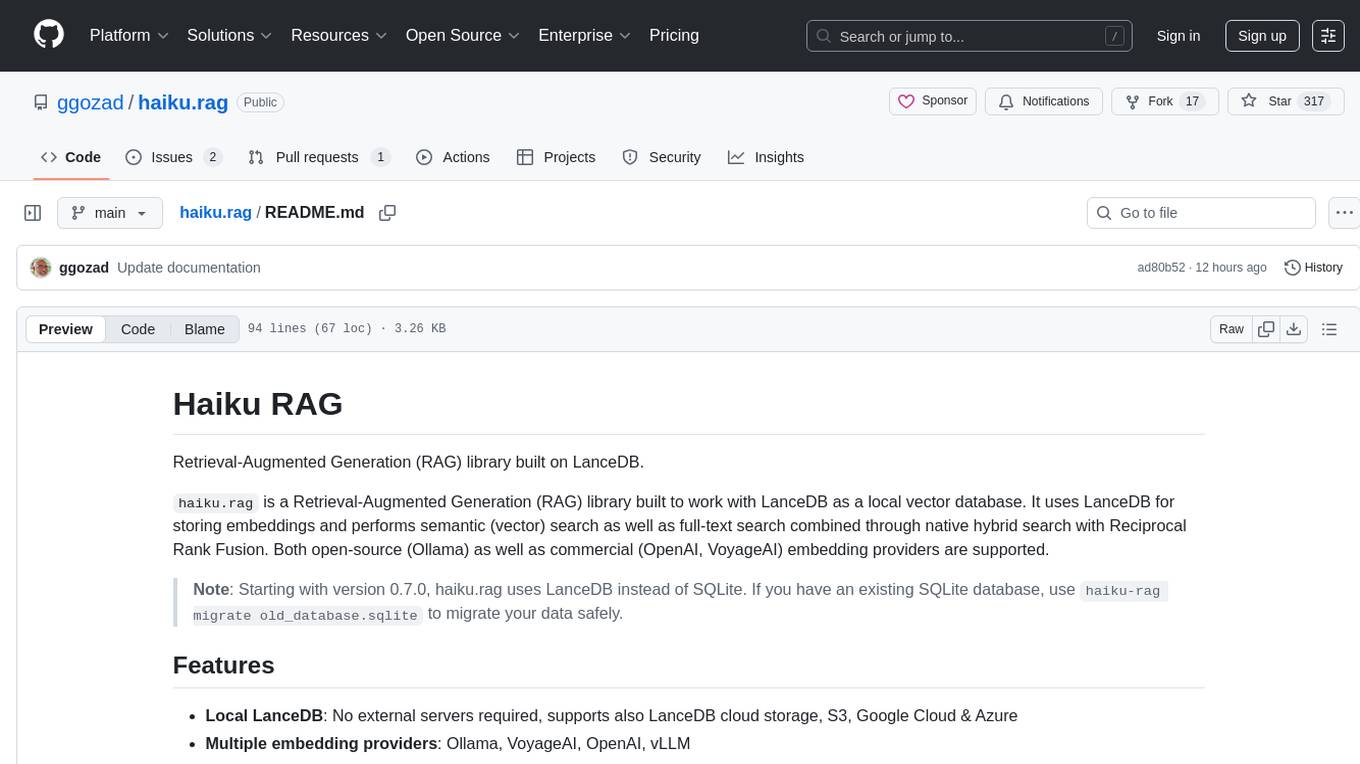
haiku.rag
Haiku RAG is a Retrieval-Augmented Generation (RAG) library that utilizes LanceDB as a local vector database. It supports semantic and full-text search, hybrid search with Reciprocal Rank Fusion, multiple embedding and QA providers, default search result reranking, question answering, file monitoring, and various file formats. It can be used via CLI or Python API, and can serve as tools for AI assistants like Claude Desktop. The library offers features for document management and search, with detailed documentation available.
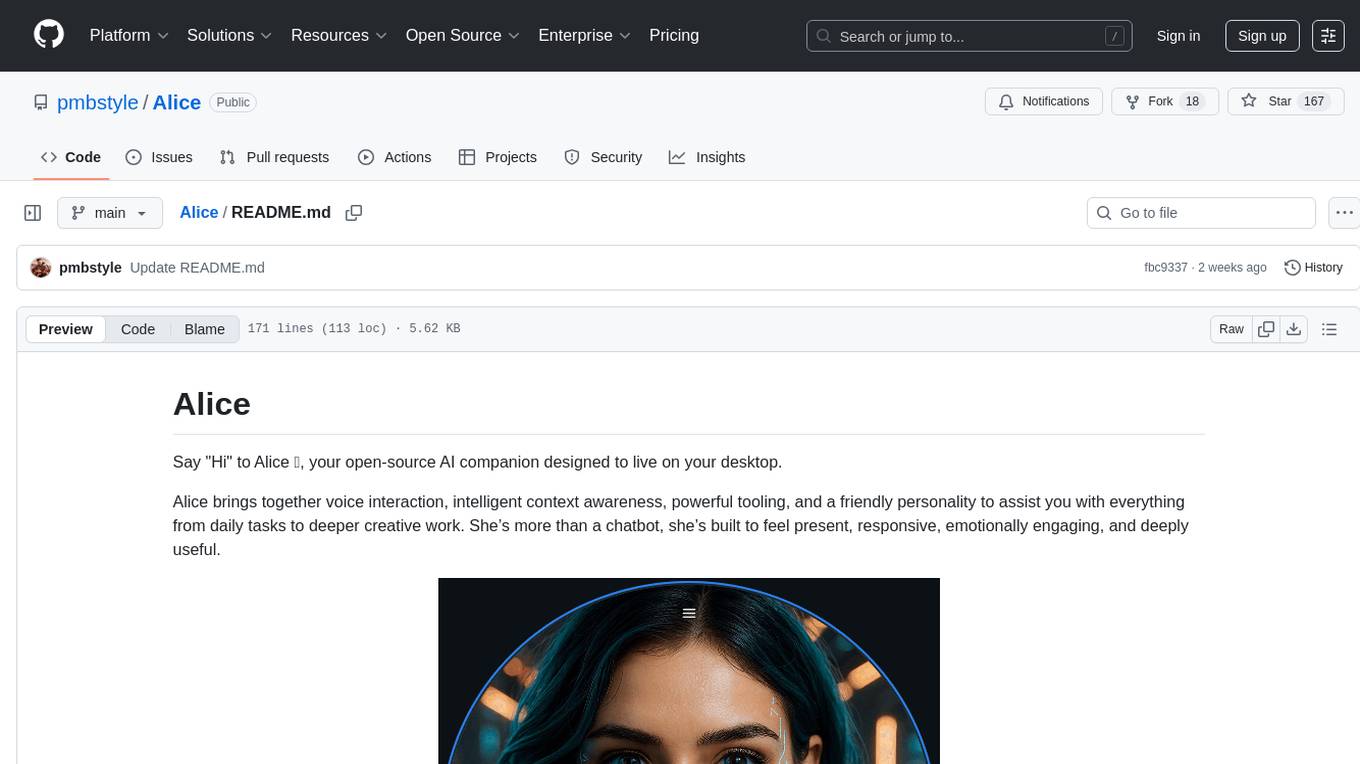
Alice
Alice is an open-source AI companion designed to live on your desktop, providing voice interaction, intelligent context awareness, and powerful tooling. More than a chatbot, Alice is emotionally engaging and deeply useful, assisting with daily tasks and creative work. Key features include voice interaction with natural-sounding responses, memory and context management, vision and visual output capabilities, computer use tools, function calling for web search and task scheduling, wake word support, dedicated Chrome extension, and flexible settings interface. Technologies used include Vue.js, Electron, OpenAI, Go, hnswlib-node, and more. Alice is customizable and offers a dedicated Chrome extension, wake word support, and various tools for computer use and productivity tasks.
For similar tasks

NaLLM
The NaLLM project repository explores the synergies between Neo4j and Large Language Models (LLMs) through three primary use cases: Natural Language Interface to a Knowledge Graph, Creating a Knowledge Graph from Unstructured Data, and Generating a Report using static and LLM data. The repository contains backend and frontend code organized for easy navigation. It includes blog posts, a demo database, instructions for running demos, and guidelines for contributing. The project aims to showcase the potential of Neo4j and LLMs in various applications.
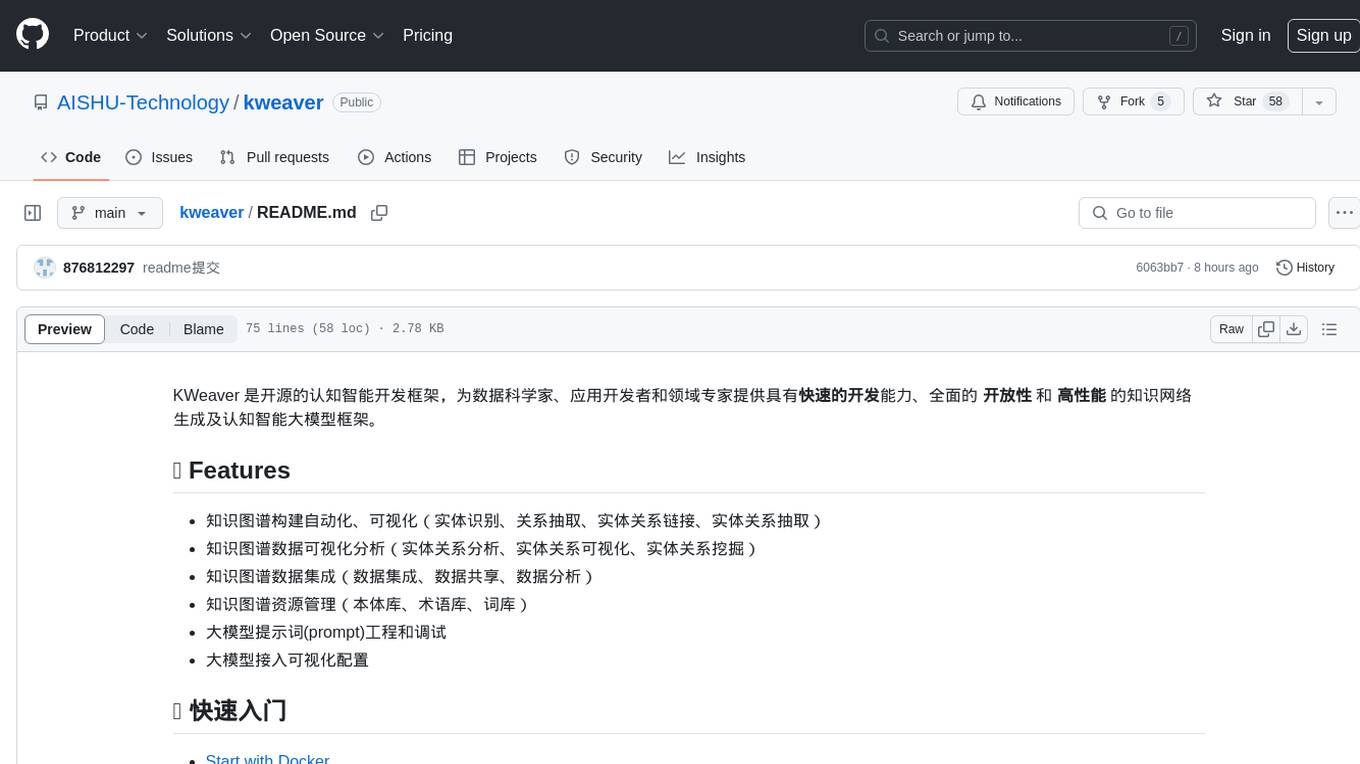
kweaver
KWeaver is an open-source cognitive intelligence development framework that provides data scientists, application developers, and domain experts with the ability for rapid development, comprehensive openness, and high-performance knowledge network generation and cognitive intelligence large model framework. It offers features such as automated and visual knowledge graph construction, visualization and analysis of knowledge graph data, knowledge graph integration, knowledge graph resource management, large model prompt engineering and debugging, and visual configuration for large model access.
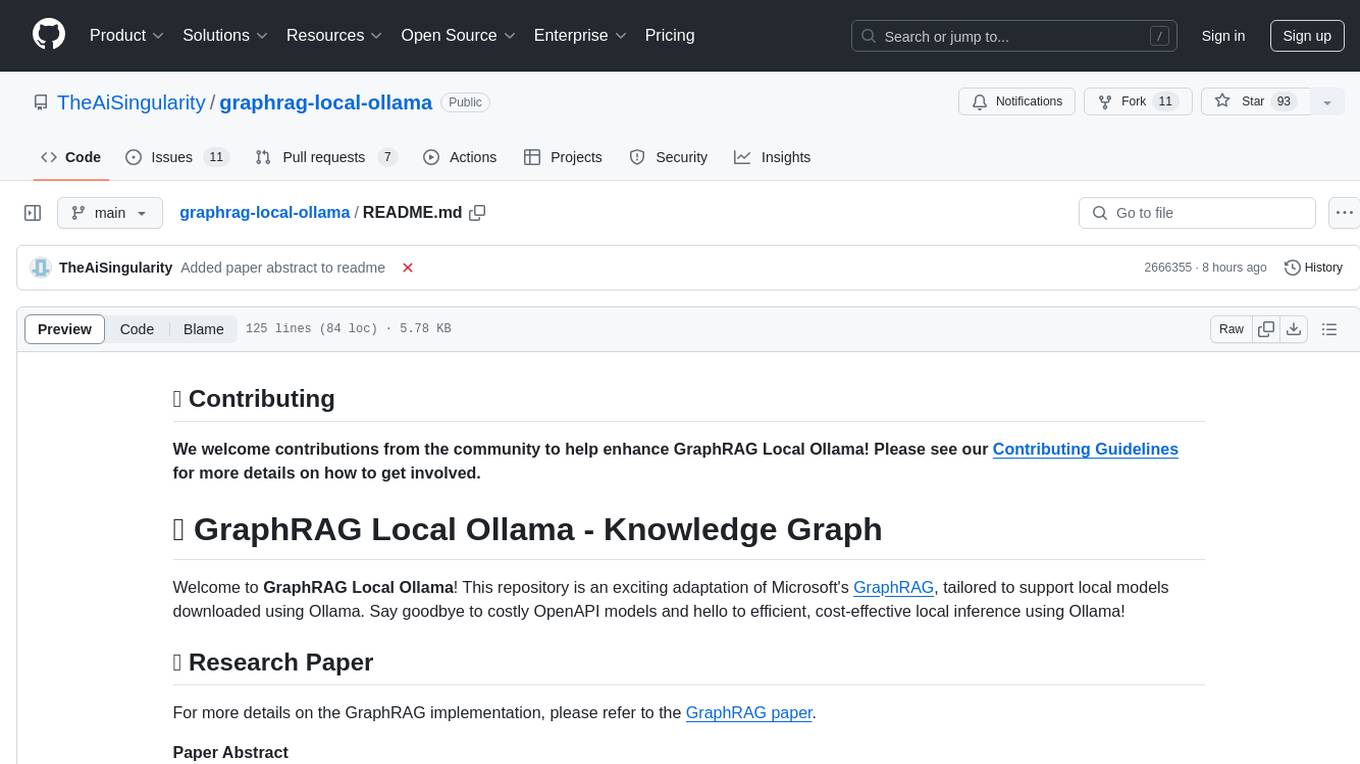
graphrag-local-ollama
GraphRAG Local Ollama is a repository that offers an adaptation of Microsoft's GraphRAG, customized to support local models downloaded using Ollama. It enables users to leverage local models with Ollama for large language models (LLMs) and embeddings, eliminating the need for costly OpenAPI models. The repository provides a simple setup process and allows users to perform question answering over private text corpora by building a graph-based text index and generating community summaries for closely-related entities. GraphRAG Local Ollama aims to improve the comprehensiveness and diversity of generated answers for global sensemaking questions over datasets.
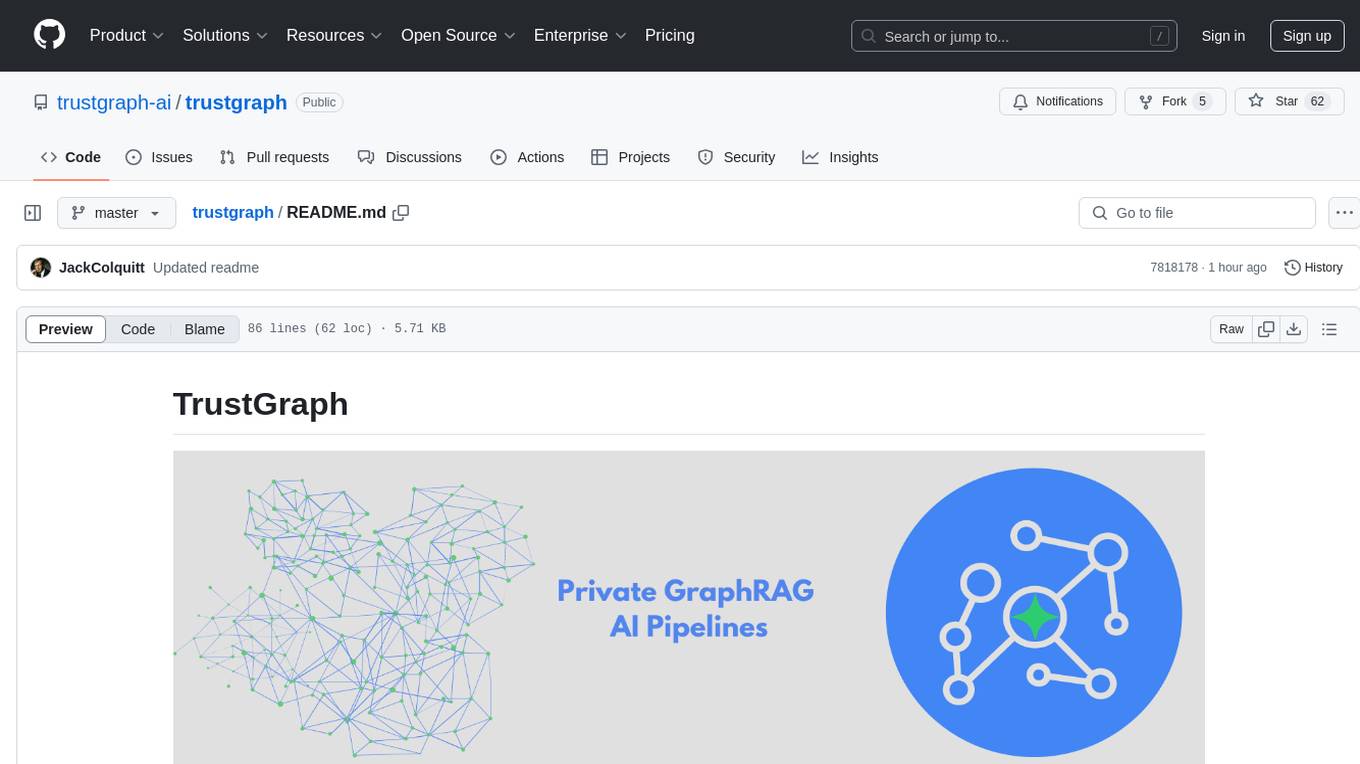
trustgraph
TrustGraph is a tool that deploys private GraphRAG pipelines to build a RDF style knowledge graph from data, enabling accurate and secure `RAG` requests compatible with cloud LLMs and open-source SLMs. It showcases the reliability and efficiencies of GraphRAG algorithms, capturing contextual language flags missed in conventional RAG approaches. The tool offers features like PDF decoding, text chunking, inference of various LMs, RDF-aligned Knowledge Graph extraction, and more. TrustGraph is designed to be modular, supporting multiple Language Models and environments, with a plug'n'play architecture for easy customization.
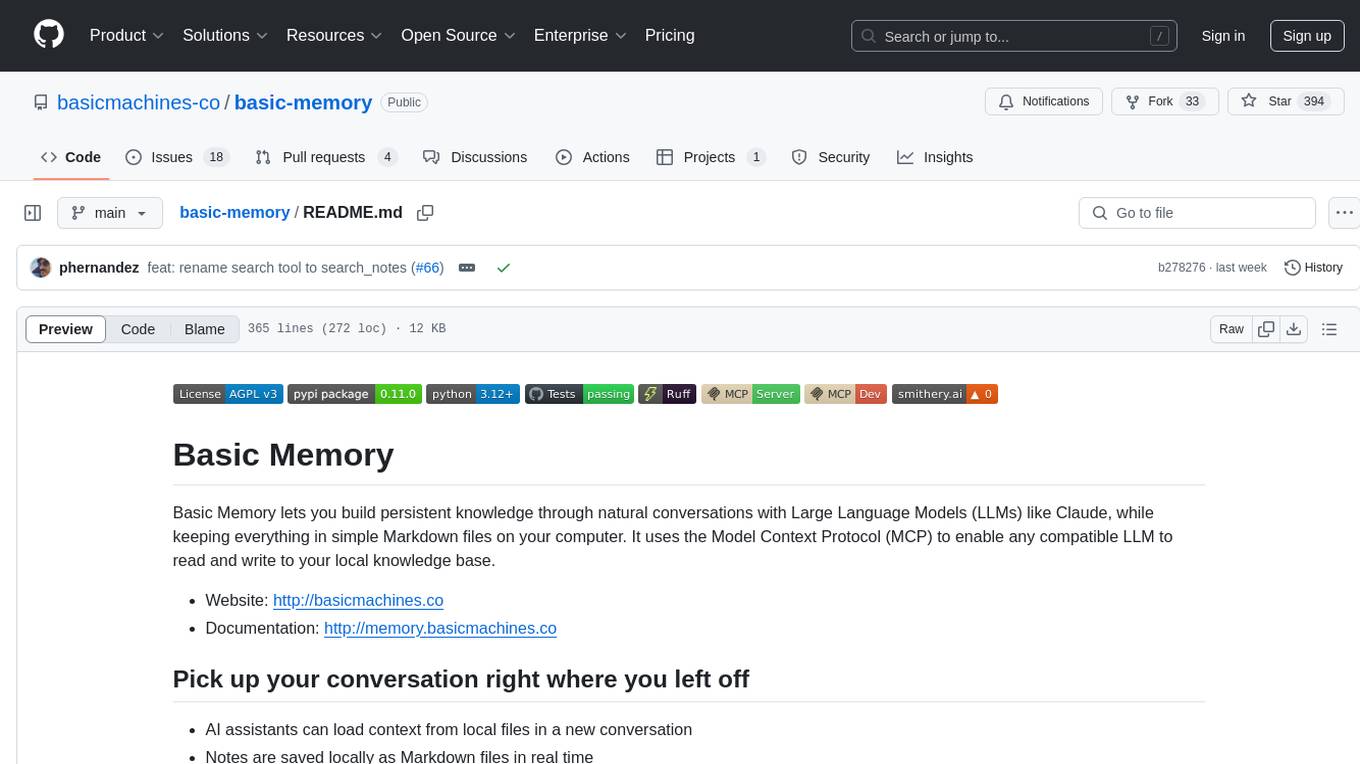
basic-memory
Basic Memory is a tool that enables users to build persistent knowledge through natural conversations with Large Language Models (LLMs) like Claude. It uses the Model Context Protocol (MCP) to allow compatible LLMs to read and write to a local knowledge base stored in simple Markdown files on the user's computer. The tool facilitates creating structured notes during conversations, maintaining a semantic knowledge graph, and keeping all data local and under user control. Basic Memory aims to address the limitations of ephemeral LLM interactions by providing a structured, bi-directional, and locally stored knowledge management solution.
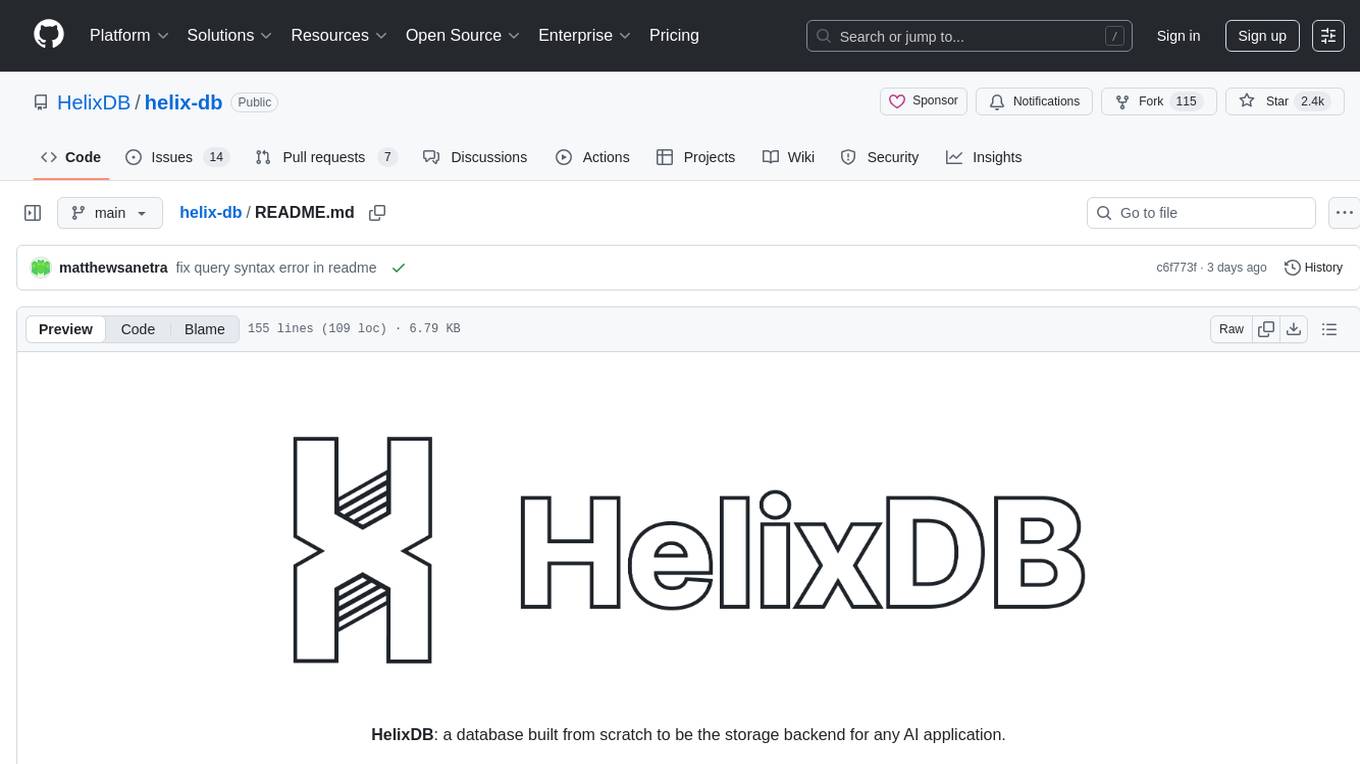
helix-db
HelixDB is a database designed specifically for AI applications, providing a single platform to manage all components needed for AI applications. It supports graph + vector data model and also KV, documents, and relational data. Key features include built-in tools for MCP, embeddings, knowledge graphs, RAG, security, logical isolation, and ultra-low latency. Users can interact with HelixDB using the Helix CLI tool and SDKs in TypeScript and Python. The roadmap includes features like organizational auth, server code improvements, 3rd party integrations, educational content, and binary quantisation for better performance. Long term projects involve developing in-house tools for knowledge graph ingestion, graph-vector storage engine, and network protocol & serdes libraries.
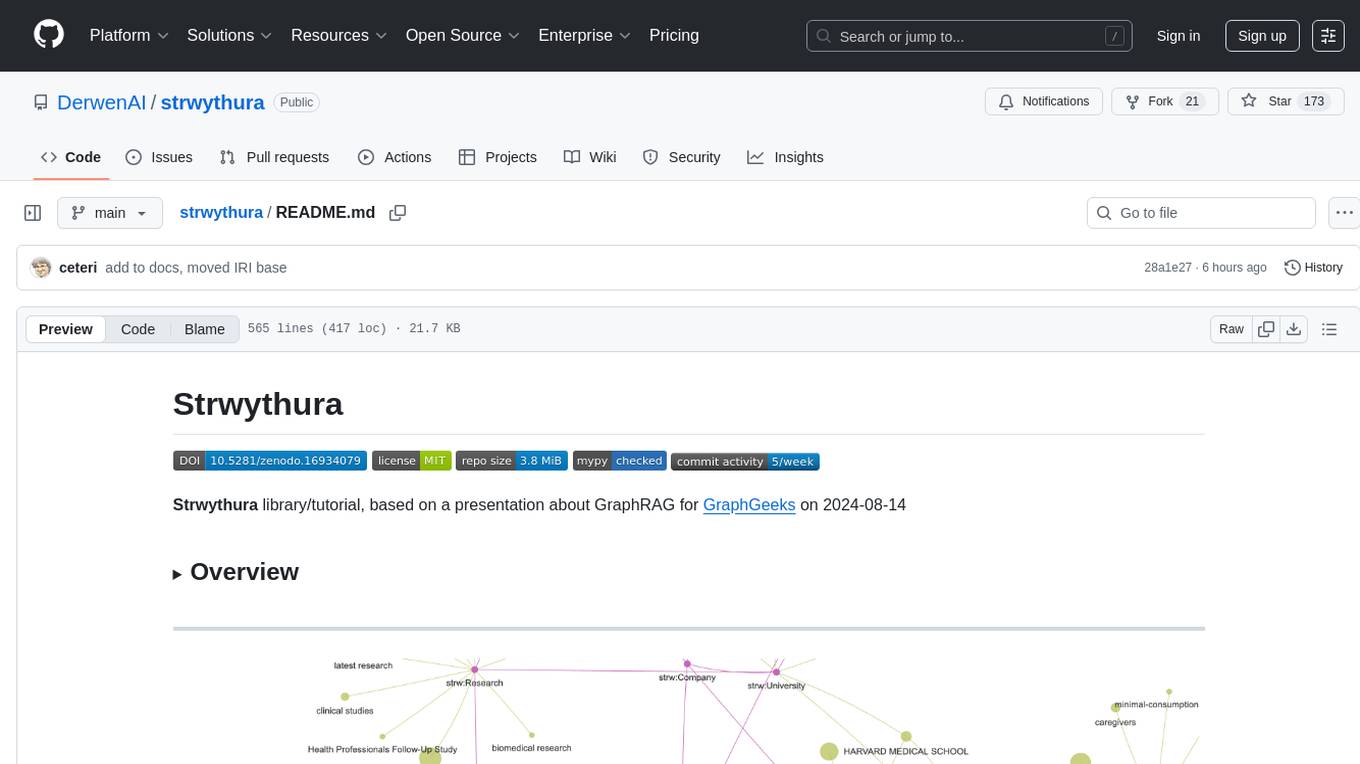
strwythura
Strwythura is a library and tutorial focused on constructing a knowledge graph from unstructured data sources using state-of-the-art models for named entity recognition. It implements an enhanced GraphRAG approach and curates semantics for optimizing AI application outcomes within a specific domain. The tutorial emphasizes the use of sophisticated NLP pipelines based on spaCy, GLiNER, TextRank, and related libraries to provide better/faster/cheaper results with more control over the intentional arrangement of the knowledge graph. It leverages neurosymbolic AI methods and combines practices from natural language processing, graph data science, entity resolution, ontology pipeline, context engineering, and human-in-the-loop processes.

ApeRAG
ApeRAG is a production-ready platform for Retrieval-Augmented Generation (RAG) that combines Graph RAG, vector search, and full-text search with advanced AI agents. It is ideal for building Knowledge Graphs, Context Engineering, and deploying intelligent AI agents for autonomous search and reasoning across knowledge bases. The platform offers features like advanced index types, intelligent AI agents with MCP support, enhanced Graph RAG with entity normalization, multimodal processing, hybrid retrieval engine, MinerU integration for document parsing, production-grade deployment with Kubernetes, enterprise management features, MCP integration, and developer-friendly tools for customization and contribution.
For similar jobs

sweep
Sweep is an AI junior developer that turns bugs and feature requests into code changes. It automatically handles developer experience improvements like adding type hints and improving test coverage.

teams-ai
The Teams AI Library is a software development kit (SDK) that helps developers create bots that can interact with Teams and Microsoft 365 applications. It is built on top of the Bot Framework SDK and simplifies the process of developing bots that interact with Teams' artificial intelligence capabilities. The SDK is available for JavaScript/TypeScript, .NET, and Python.

ai-guide
This guide is dedicated to Large Language Models (LLMs) that you can run on your home computer. It assumes your PC is a lower-end, non-gaming setup.

classifai
Supercharge WordPress Content Workflows and Engagement with Artificial Intelligence. Tap into leading cloud-based services like OpenAI, Microsoft Azure AI, Google Gemini and IBM Watson to augment your WordPress-powered websites. Publish content faster while improving SEO performance and increasing audience engagement. ClassifAI integrates Artificial Intelligence and Machine Learning technologies to lighten your workload and eliminate tedious tasks, giving you more time to create original content that matters.

chatbot-ui
Chatbot UI is an open-source AI chat app that allows users to create and deploy their own AI chatbots. It is easy to use and can be customized to fit any need. Chatbot UI is perfect for businesses, developers, and anyone who wants to create a chatbot.

BricksLLM
BricksLLM is a cloud native AI gateway written in Go. Currently, it provides native support for OpenAI, Anthropic, Azure OpenAI and vLLM. BricksLLM aims to provide enterprise level infrastructure that can power any LLM production use cases. Here are some use cases for BricksLLM: * Set LLM usage limits for users on different pricing tiers * Track LLM usage on a per user and per organization basis * Block or redact requests containing PIIs * Improve LLM reliability with failovers, retries and caching * Distribute API keys with rate limits and cost limits for internal development/production use cases * Distribute API keys with rate limits and cost limits for students

uAgents
uAgents is a Python library developed by Fetch.ai that allows for the creation of autonomous AI agents. These agents can perform various tasks on a schedule or take action on various events. uAgents are easy to create and manage, and they are connected to a fast-growing network of other uAgents. They are also secure, with cryptographically secured messages and wallets.

griptape
Griptape is a modular Python framework for building AI-powered applications that securely connect to your enterprise data and APIs. It offers developers the ability to maintain control and flexibility at every step. Griptape's core components include Structures (Agents, Pipelines, and Workflows), Tasks, Tools, Memory (Conversation Memory, Task Memory, and Meta Memory), Drivers (Prompt and Embedding Drivers, Vector Store Drivers, Image Generation Drivers, Image Query Drivers, SQL Drivers, Web Scraper Drivers, and Conversation Memory Drivers), Engines (Query Engines, Extraction Engines, Summary Engines, Image Generation Engines, and Image Query Engines), and additional components (Rulesets, Loaders, Artifacts, Chunkers, and Tokenizers). Griptape enables developers to create AI-powered applications with ease and efficiency.



